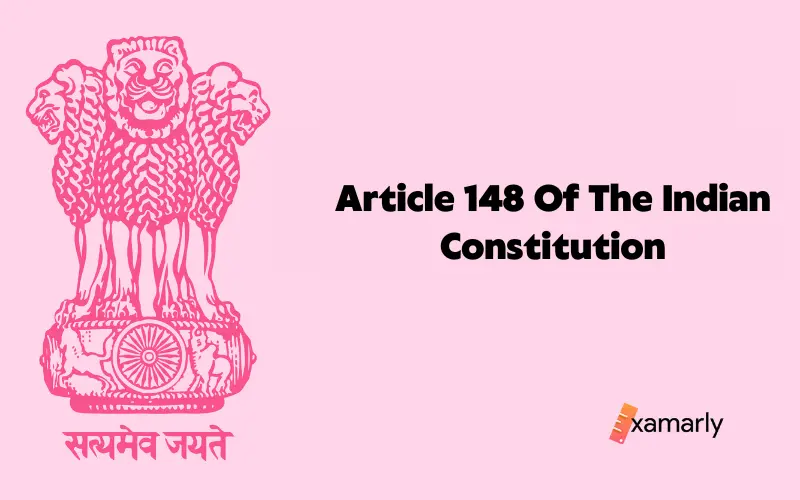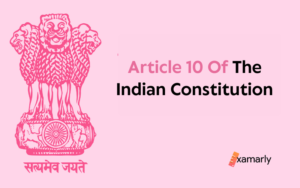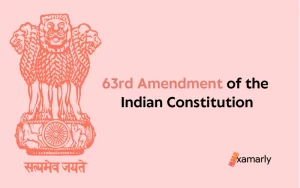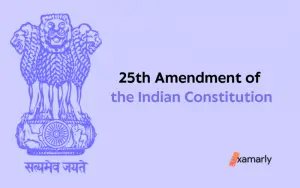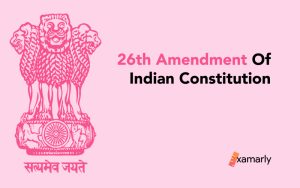Article 148 of the Indian Constitution talks about the Comptroller and the Auditor General of India.
It talks about the most relevant aspects of the CAG of India, like eligibility, nature of service, salaries, and allowances, among other important things.
We will understand all the concepts presented in detail in this article in further paragraphs. But before that, let us reflect on the role of the Comptroller and Auditor General in the office of government.
- Role Of Comptroller and Auditor General Of India
- Article 148 Of The Indian Constitution – In Detail
- Clause 1 – As it is & Explained
- Clause 2 – As it is & Explained
- Clause 3 – As it is & Explained
- Clause 4 – As it is & Explained
- Clause 5 – As it is & Explained
- Clause 6 – As it is & Explained
- Summing Up
- FAQs
Role Of Comptroller and Auditor General Of India
Indian law, specifically Article 148 of the Constitution, designates the Comptroller and Auditor General as the country’s highest auditing authority.
The Government of India and the State Governments, as well as autonomous entities and firms significantly sponsored by the Government, are subject to audit by these authorities.
The CAG is also responsible for conducting additional audits of government enterprises in which the government owns at least 51% of the stock or of government companies that are wholly owned subsidiaries of other government companies.
Public Accounts Committees (PACs) and Committees on Public Undertakings (COPUs) are special committees within the Parliament of India and the state legislatures that take up the CAG’s findings for debate. The Indian Audit and Accounts Department report to the CAG, which oversees its operations with the help of the Indian Audit and Accounts Service.
Article 148 Of The Indian Constitution – In Detail
We will understand Article 148 of the Indian Constitution in detail by analysing each and every clause present in it.
Clause 1 – As it is & Explained
(1) There shall be a Comptroller and Auditor General of India who shall be appointed by the President by warrant under his hand and seal and shall only be removed from office in like manner and on the like grounds as a Judge of the Supreme Court
The first clause of Article 148 of the Indian Constitution says that there will be a Comptroller and Auditor General of India who will be appointed by the President.
The President would appoint him by warrant under his seal. The article also talks about the nature of the removal of the Comptroller and Auditor General of India.
It says that if someday the CAG has to be removed from his post, then it should happen in the manner same as with that of the removal of a Judge of the Supreme Court. It shall also be taken in consideration that the CAG can be removed on the same grounds defined for those of a Judge of the Supreme Court of India.
Clause 2 – As it is & Explained
(2) Every person appointed to be the Comptroller and Auditor General of India shall, before he enters upon his office, make and subscribe before the President, or some person appointed in that behalf by him, an oath or affirmation according to the form set out for the purpose in the Third Schedule
The second clause of Article 148 of the Indian Constitution says that every person who will be appointed by the President as the Comptroller and Auditor General of India will have to go through the oath ceremony.
Either the person appointed or someone on the behalf of the person appointed has to take the oath before the President of India before commencing his office.
The oath that has to be taken should be taken as per the format defined in the Third Schedule of the Indian Constitution.
Clause 3 – As it is & Explained
(3) The salary and other conditions of service of the Comptroller and Auditor General shall be such as may be determined by Parliament by law and, until they are so determined, shall be as specified in the Second Schedule: Provided that neither the salary of a Comptroller and Auditor General nor his rights in respect of leave of absence, pension or age of retirement shall be varied to his disadvantage after his appointment
The third clause of Article 148 of the Indian Constitution says that the Parliament has the power and authority to to lawfully define the salary and other important aspects of the service of the Comptroller and Auditor General Of India.
It also says that until and unless, the Parliament makes any changes lawfully, the nature of service and the salaries will remain as defined in the Second Schedule of the Indian Constitution.
An important point here to note is that the salary, rights, leaves, pension, and age of retirement of a Comptroller and Auditor General of India can never be regulated in a way that will not be beneficial for him and rather will be a disadvantage for him.
Clause 4 – As it is & Explained
(4) The Comptroller and Auditor General shall not be eligible for further office either under the Government of India or under the Government of any State after he has ceased to hold his office
The fourth clause of Article 148 of the Indian Constitution says that once the Comptroller and Auditor General has stopped holding his office, he cannot hold any further office under either the Central Government or the State Government.
Clause 5 – As it is & Explained
(5) Subject to the provisions of this Constitution and of any law made by Parliament, the conditions of service of persons serving in the Indian Audit and Accounts Department and the administrative powers of the Comptroller and Auditor General shall be such as may be prescribed by rules made by the President after consultation with the Comptroller and Auditor General
The fifth clause says that the President, in consultation with the Comptroller and Auditor General, will make rules establishing the terms and conditions of service of employees of the Indian Audit and Accounts Department and the scope of the Comptroller and Auditor General’s administrative powers, subject to the provisions of this Constitution and any law made by Parliament.
Clause 6 – As it is & Explained
(6) The Administrative expenses of the office of the Comptroller and Auditor General, including all salaries, allowances and pensions payable to or in respect of pensions serving in that office, shall be charged upon the Consolidated Fund of India
The sixth clause of Article 148 of the Indian Constitution says that all the expenses that are to be paid in order to run the administration of the office of the Comptroller and Auditor General, including salaries, allowances, and pensions, will be paid from the Consolidated Fund of India.
Summing Up
We can conclude from Article 148 of the Indian Constitution that like any other prominent office of the country, the office of the Comptroller and Auditor General is also maintained in the same way.
FAQs
How is the independence of the CAG ensured?
His appointment by the President of India’s Special Procedure for Removal (like a Supreme Court Judge) had his salary and expenses charged (not voted) to the Consolidated Fund of India.
These rules make sure that the CAG can do audits in a way that is independent and fair, as the Constitution requires. prohibiting him from serving in any other government position when his current term ends.
How does CAG perform his role?
The Indian Audit and Accounts Department (IA&AD) provides support to the CAG in his constitutional duties.
About 600 officials from the Indian Audit and Accounts Service (IA&AS) work at the IA&AD’s upper and lower management levels. They are either hired on the spot via the UPSC’s Civil Service Exam or brought in through the ranks of Group B through promotions (supervisory staff).
There are roughly 47,000 subordinate cadres. Group B consists of senior audit/accounts officers, audit officers, and assistant audit/accounts officers, whereas Group C is made up of support workers (Group C).
Whom does the CAG audit?
The CAG audits the following groups:-
Almost every branch of the Indian government, from the Ministry of Railways to the Ministry of Defense to the Department of Posts and Telecommunications.
There are around 1500 government-owned and -operated commercial entities (i.e., firms and businesses) operating at the federal and state levels.
There are over 400 government-owned or -controlled non-commercial autonomous entities and agencies.
Some local councils and Panchayati Raj Institutions, crucial grass-root entities for implementing developmental programmes and delivering services, received considerable funding from the Union.
What powers does the CAG have to perform his role?
To ensure he has full authority to fulfil his expansive auditing responsibilities, the Act stipulates:
Authorization to visit any audited business or institution.
Possession of the authority to investigate all financial dealings and interrogate the executive.
Authorization to inspect any and all books, records, and documents belonging to any organisation being audited.
Control over the audit’s scope and methodology.
What happens to the Audit Reports?
Both the President of the United States and each state’s governor are responsible for tabling the CAG’s report in their respective legislatures. A permanent referral to the Central and State Standing Committees on Public Accounts (PAC)/Committees on Public Undertakings occurs after the Reports have been submitted in the House (COPU).
These expert committees were set up to review the Annual Accounts and Audit Reports in a timely manner and in great detail. Hearings are held on the findings and recommendations from our reports that the Committees determine are most important to the public interest. In this regard, we offer the Committees our technical support.
The committee hearings are where the executive may be held accountable for their actions or lack thereof. Reports to the Legislature summarizing the committee’s hearings, the executive’s response, and the committee’s recommendations for improving administrative policies and procedures are based on the findings of the examination.


